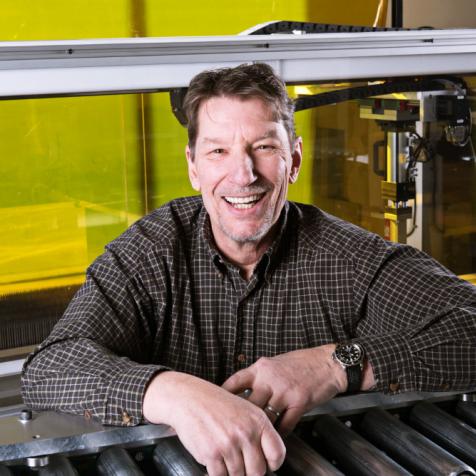
Altair Industries
By Eric Peterson | Jan 16, 2018
Company Details
Location
Fort Collins, Colorado
Founded
2001
Ownership Type
Private
Employees
3
Products
Manufacturing automation
Fort Collins, Colorado
Founded: 2001
Privately owned
Employees: 3
Industry: Industrial & Equipment
Products: Custom manufacturing automation
Founder and President Rick Coate leverages efficient engineering and design in his manufacturing automation solutions.
After working for several companies in automation in New York and Texas, Coate "got tired of Texas and moved to Colorado" in 1990. He worked for Apogee Robotics in Fort Collins and Eclipse Automation in Longmont before striking out on his own with Altair.
With a background spanning engineering, operations, and management, Coate set out to create a stable company focused on the smaller automation jobs that larger companies might sneer at, but he wanted to keep it small. He'd seen problems with cash flow and overhead complicate his previous employers, so Coate looked to avoid the treadmill of one risky job after another. "It's going to come back and bite you," he says. "I said, 'I'm just going to do this myself. I'm tired of working for other people.'"

Altair's first client was Waterpik in August 2001. A month later in the wake of 9/11, Coate found it challenging to land a second customer. "I'd just gone into business," he says. "I probably made 500 cold calls. I picked up the Colorado Manufacturers Directory."
But those 500 calls only resulted in a handful of proposals, and no contracts. "Nothing happened," says Coate. "I was in dire straits."
He decided to narrow his market in 2002. "I started focusing on the medical industry and medical device manufacturers," says Coate. He quickly closed on a contract with Covidien. "I found they were very receptive to a low-overhead company such as myself. . . . They want what they want, they want it on time, and they don't care what it costs."

The strategy succeeded. Altair nabbed job after job in the $10,000 to $50,000 range that were deemed too small by larger automation providers. "Nobody could compete with me," says Coate. "It was just a cakewalk."
His workflow revolves around efficiency and simplicity. "Once I get a job, I always spend a two-day period and see how I could make the job simpler," he explains. "I usually figure out how to increase my margins through better design."
Making and integrating automated presses and screwdriver, dispensing, and assembly systems, Altair's jobs have grown over the years. "Growth has mainly been in the dollar size of the projects," says Coate. "My biggest job to date was $750,000."

Medical projects remain about half of the company's business, and aerospace is its second-largest vertical, followed by "general manufacturing," he adds.
Annual revenues are typically in the $500,000 to $750,000 range. Coate keeps expenses as low as possible, working from a 1,200-square-foot space that Altair recently bought in northeast Fort Collins. The company has an in-house machine shop. "Interestingly enough, I've tried very hard not to grow," he adds. "It's a strange business model, but it works very well for me."
When demand is high, Altair has a network of contract manufacturers it can outsource work to bring projects in on time. "That's when I farm out machining," explains Coate. "Typically, my rule of thumb is: 'Don't farm out anything you can do yourself, but there are only so many hours in a day."

Altair is staying on the leading edge of object recognition. "Over the last four to five years, we've done a lot with machine vision," says Coate. "That used to be very expensive." But the technology is increasingly commoditized; Altair utilizes National Instruments' LabVIEW platform, "a product that's well-suited for industrial automation."
A machine vision system used to involve an investment of at least $20,000, says Coate, but that's changed. "I could put a vision system in somebody's hand for $3,000 to $5,000."
"We recently finished up [a project] with a Colorado manufacturer that deals in textiles," says Coate. Altair built a system with a dozen cameras and 35 servo motors that steered "a web of carbon-fiber strands," he explains. "Our job was to make sure the strands were the right width and in the right position so six of these strands would make up a sheet."

Challenges: "The big challenges are how to get the work done in a timely manner with a lean crew," says Coate, who has to wear many hats to make Altair's model work.
"I was a mechanical engineer, but I learned electrical engineering because I had to," he says. "I do all of the engineering, and I'm up late at night doing the accounting. . . . I typically work around 70 hours a week."
Same goes for his employees: "Small company, small company resources -- everybody's got to be an ace," says Coate. "I hire on character and train them."

Opportunities: "I try to focus on Colorado because it's most efficient to work in Colorado," says Coate.
He also sees continued opportunities in medical sector, and notes, "I have made some inroads with national companies."
But Altair's business model is decidedly indifferent about growth. "Growth is not something I really seek," says Coate. "We have enough recurring business, and new opportunities keep on showing up. . . I see no reason to add space, overhead, or employees and put myself in a situation if the economy tanks again, I've got all of this overhead to take care of."
Needs: Not too many. "The business works how it is," says Coate. He highlights marketing needs for Altair's sister company, Rocky Mountain Performance Products, that makes exhaust baffles and floorboards for motorcycles.
